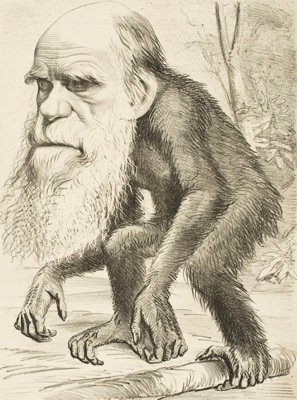
 |
Charles DarwinCharles Darwin (1809-1882) was the English naturalist who proposed the theory of evolution by Natural Selection. Charles Darwin was born on England. On his father's side, he was the grandson of Erasmus Darwin (who is himself famous as a natural philosopher), and on his mother's, the grandson of Josiah Wedgwood (famous for the industrialization of pottery manufacture). Charles Darwin was educated at Edinburgh and Cambridge Universities, and famously went on a 5 year (1831 to 1836) voyage with HMS Beagle - while the ship surveyed and charted coasts, Darwin investigated geology and collected natural history specimens. 
Over the next few years, Darwin gradually developed his theory of Natural Selection. Darwin however held back from publishing his theory, perhaps noting the storm of controversy caused by a popular-science book about Lamarkian evolution, Vestiges of the Natural History of Creation, which was anonymously published (but written by a Scottish journalist, Robert Chambers). Although, Darwin considered the science of Vestiges of the Natural History of Creation to be weak, it did allow to further develop his own work, and anticipate potential counter-arguments. In 1856, through his friend, the eminent geologist Sir Charles Lyell, Darwin became aware of the work of Alfred Russel Wallace, who seemed to be thinking along similar lines to Darwin. Lyell urged Darwin to publish in order to establish priority, and Darwin began work on a short paper - which eventually grew into a large book. In 1857, Darwin sent an abstract of his book to the American botanist, Asa Grey. In 1858, while Darwin's own book was still only half complete, Darwin received a paper from Wallace describing Natural Selection. As a result, although Darwin himself could not attend since his baby son had died of scarlet fever, Darwin's friends Lyell and Joseph Dalton Hooker, made a joint presentation to the Linnean Society on July 1st. Finally, in 1859, Darwin published "On the Origin of Species by Means of Natural Selection, or The Preservation of Favoured Races in the Struggle for Life" (usually abbreviated to simply "On the Origin of Species "On the Origin of Species 
Darwin died in 1882, aged 71, and was given a state funeral at Westminister Abbey (one of only five non-royals to ever receive this honor). Even during his lifetime, many species and geographical places and locations have been named after him, and this has continued through to the present day. Many biographical and fictional works about Darwin's life have been written, he has also been remembered on British currency (including a special commemorative two pound coin issued in 2009) and by Darwin Day, which marks the anniversary of his birth. During Darwin's life, the main opposition to his theory came from religious people, and even today there are many religious people who do not accept the idea of evolution or Darwin's ideas in particular. (although in 2008 the Church of England issued an apology stating "for misunderstanding you and, by getting our first reaction wrong, encouraging others to misunderstand you still"). As far as the scientific community is concerned, although the idea of evolution was quickly and widely accepted, it took quite a few years until Darwin's mechanism, Natural Selection, was generally accepted as the process by which evolution occurred - indeed it was not until the development of the "Modern Evolutionary Synthesis" (which combined Darwin's theory of Natural Selection with Mendelian genetics) in the 1930s. Today however, although there remains debate about various detailed technical issues, Natural Selection and Mendelian genetics together form the basis of our understanding of biology. (from The Hornet magazine 1871): 
Related Information & ResourcesSee Also Linking to This PageWe do hope that you find this site useful. We welcome people linking to this website or citing us. |
|
|